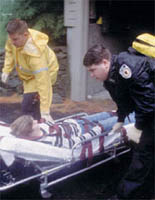Propane Distributors: When you click on the link below, you will need |
|
Propane Tank Owner/Renters: Individual customers can log in to check their tank. |
|
 TRAGEDY PROMPTS LEGISLATION A dozen states and cities soon will have residential CO detector requirements. Winter circumstances often lead to conditions for accidental carbon monoxide (CO) poisoning. Fortunately, CO alarms are increasingly being installed by homeowners and landlords. Unfortunately, for a young family in Massachusetts, their two-year old home – with brand new, energy-efficient, propane-powered appliances – did not have a CO alarm. A combination of factors led to the death of the couple’s young daughter, and the wife’s pregnancy terminating early. Fire department personnel have indicated that snow had piled up against the wall of the family’s home. In addition to not having a CO detector, the home may also have had one other shortfall – the sidewall vent. In regions with snow, sidewall vents are to be installed at a height above the average snowfall, according to the National Fire Protection Association (NFPA) code. The investigation has not ruled out the furnace or other CO sources as the cause, either. CO poisoning is the leading cause of accidental poisoning in the country. Detectors have been available for more than a decade, but fewer than a third of U.S. homes have them. Detector sensitivity is now set at 70 ppm. Will installing CO detectors prevent further problems? Should all homes and apartments have CO and gas detectors in addition to smoke alarms? NASCorp’s SkyTracker™ tank and home monitors make CO presence detection a standard feature of its SkyHelp™ Service. SkyTracker™, therefore, is a timely appliance. Four states – New York, New Jersey, Rhode Island and West Virginia – require CO detectors. Massachusetts, with the backing of fire departments, quickly introduced legislation mandating CO detectors. Another CO leak that killed one person in late January in Vermont, has also sparked a push to require CO detectors. Several large cities, including Chicago, have similar regulations. Studies of cities with the ordinances indicate that they do work, but CO detectors don’t work like smoke detector. Smoke detectors are designed to get people out of a building. CO detectors are a tool to monitor the gas level inside a structure. They alert people when gas levels rise above 70 ppm and give them a chance to open windows or to get the offending appliance working. In SkyTracker’s™ SkyHelp Services™, package, the propane dealer, local authorities or even another family member or friend can receive warning by satellite via e-mail, text message or page. Another life-saving device is a gas detector that monitors propane leaks. These devices, along with CO and smoke alarms, are a part of any subscription to SkyTracker™ End-user services of SkyHelp™ or SkyHome Monitoring™. At one court hearing, the plaintiffs argued that the propane retailer was negligent in failing to provide proper warnings to propane users, including the failure to warn users to install CO and gas detector units. Ultimately, the case was resolved without further hearing, but isn’t peace of mind that SkyTracker™ offers the best value? |
North American Satellite Corporation
| Carbon Monoxide | Propane |


